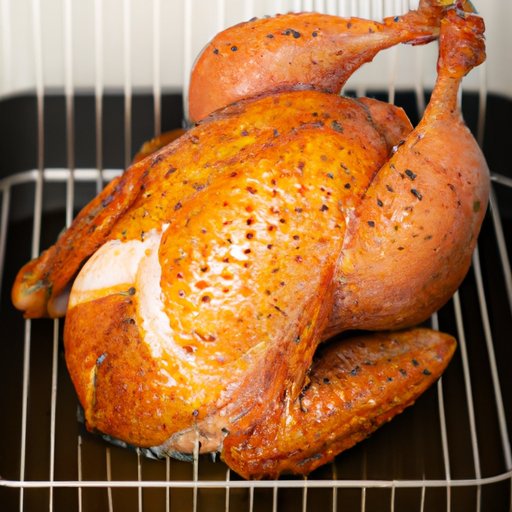
Introduction
If you want to serve a perfectly juicy and delicious turkey, you should consider brining it! Brining is an essential step for preparing a savory and moist turkey that will leave your guests asking for more. In this article, we will explore how long should you brine a turkey to achieve the best possible results.
Benefits of Brining
Brining is a process of soaking turkey in a saltwater solution before cooking. By adding salt and other seasonings to the water, brining can enhance the flavor and texture of the turkey, making it juicier and more flavorful.
The science behind brining is simple. When you immerse turkey in a saltwater solution, the salt molecules break down the muscle fibers and encourage the meat to absorb extra moisture. During the cooking process, this absorbed moisture helps to keep the meat moist and tender.
Factors that Affect Brining Time
When it comes to brining, several factors can affect the time required to achieve the best results. Here are some of the key factors to consider when deciding how long to brine your turkey:
- Turkey size: The larger the bird, the longer it takes to brine.
- Brine concentration: The amount of salt and other seasonings in the brine can affect the time required.
- Refrigeration temperature: The temperature at which you keep the turkey while it’s brining can influence how quickly the turkey absorbs the brine.
Typically, you should brine your turkey for around an hour per pound of turkey. However, depending on these factors, you may want to adjust the timing.
Different Brining Techniques and Time Required
Brining can be done using two methods; wet brining and dry brining.
Wet brining involves immersing the turkey in a saltwater solution for a specific period, while a dry brine involves rubbing a mixture of salt and seasonings directly onto the turkey’s skin. While both methods achieve similar results, the timing can vary for each method.
When wet brining, the turkey should be fully immersed, and you will need to give it ample time to soak up the brine. Most recipes recommend brining for at least 12 hours, but anything up to 24 hours is ideal for best results. When dry brining, you will need to rub the salt mixture onto the turkey’s skin for at least 24 hours before cooking.
Brining Tips for Perfect Turkey
There are several tips to consider when brining your turkey to ensure that it’s perfectly juicy and delicious:
- Start early: Allow yourself plenty of time when brining your turkey. Plan to start 24-48 hours before you plan on cooking it to ensure adequate brining time.
- Brine strength: Use the optimal salt to water ratio (1 cup salt per gallon of water) to ensure that the brine is not too strong or weak.
- Flavorings: You can enhance the flavor of your turkey by adding herbs, spices, and other aromatics to the brine solution. Apple cider, brown sugar, onion, and garlic are all excellent flavorings for a turkey brine.
- Container: Choose a non-reactive container for brining, such as plastic or stainless steel. Avoid using aluminum or copper vessels, as they can react with the brine and produce off flavors.
- Rinsing: Once you remove the turkey from the brine, make sure to rinse it thoroughly with water. Failing to rinse the turkey properly can result in an overly salty taste.
Common Brining Mistakes
While brining may seem simple, there are several common mistakes that people make when brining their turkey. Here are some mistakes to avoid:
- Brining for too long: Brining for an extended period can result in an overly salty taste and a mushy texture.
- Using too much salt: Overly salty brine can ruin the turkey. Using the recommended 1 cup of salt per gallon of water is sufficient.
- Not refrigerating: Ensure your turkey stays cool while it’s brining to inhibit bacteria growth and ensure food safety.
Conclusion
Brining is a fantastic way to guarantee an incredibly juicy and succulent turkey. The taste and texture of brined turkey is unmatched by any other method. By considering key factors and following the tips and techniques outlined in this article, you can ensure that you achieve the best possible results when brining your turkey.
In the end, the best method and optimal time to brine your turkey depend on your personal preference and the specific recipe you are following.




